- Home
- Newt Gingrich
A Nation Like No Other Page 2
A Nation Like No Other Read online
Page 2
The case against American Exceptionalism was made even more boldly in a Boston Globe column by author and journalist Neal Gabler. The article, titled “One nation under illusion,” argues:The hoariest and most oft-repeated cliche in American politics may be that America is the greatest country in the world. Every politician, Democrat and Republican, seems duty bound to pander to this idea of American exceptionalism, and woe unto him who hints otherwise. This country is “the last, best hope of mankind,” or the “shining city on the hill,” or the “great social experiment.” As if this weren’t enough, Jimmy Carter upped the fawning ante 30 years ago by uttering arguably the most damning words in modern American politics. He called for a “government as good as the American people,” thus taking national greatness and investing it in each and every one of us.
Carter was speaking when Watergate was fresh, and government had been disgraced, but still. The fact of the matter is that whenever anything really significant has been accomplished by our government, it is precisely because it was better than the American people.3
Bemoaning that “the American people are too thin-skinned and arrogant” to realize their habitual mistake of opposing benevolent government policies like ObamaCare, Gabler warns, “We’ve been living in a fool’s paradise. The result may be a government that is as good as the American people, which is something that should concern everyone.”
The purpose of such attacks on American Exceptionalism is clear: for those who believe Americans are generally stupid and mean-spirited, America’s only hope is for an enlightened governing class to impose the “correct” policies upon its people. To these elitists, the ideals of freedom that underlie American Exceptionalism obstruct the unyielding power the government needs in order to force virtue, as they define it, on a resistant citizenry.
We must expose the agenda of these radials and fight relentlessly against their coercive, big-government policies. But it is worthwhile to consider the perspective of the larger group of people who have forgotten or just don’t really understand what American Exceptionalism actually means.
President Obama, for example, simply does not understand this concept. In the past, he was outright contemptuous of American Exceptionalism, deriding Americans as “bitter” people who “cling” to guns and religion, pronouncing himself a “citizen of the world,” and denouncing America’s supposed past transgressions in front of foreign audiences. His speeches betrayed a strong unease with American power; at an April 2010 nuclear summit, Obama declared, “Whether we like it or not, we remain a dominant military superpower.”4 Most notably, he earned widespread condemnation when a Financial Times reporter asked him about American Exceptionalism point-blank, and he began his answer by asserting, “I believe in American exceptionalism, just as I suspect that the Brits believe in British exceptionalism and the Greeks believe in Greek exceptionalism.”
Recent events, however, seem to have sparked a change of heart in Obama. Just over a minute into his televised speech defending his decision to intervene in Libya, he proclaimed, “For generations, the United States of America has played a unique role as an anchor of global security and as an advocate for human freedom.” Throughout his remarks, he unmistakably conveyed the notion that there is indeed something special about America: “To brush aside America’s responsibility as a leader and—more profoundly—our responsibilities to our fellow human beings under such circumstances would have been a betrayal of who we are. Some nations may be able to turn a blind eye to atrocities in other countries. The United States of America is different.” Later, Obama invoked our founding ideals and the American Revolution:I believe that this movement of change cannot be turned back, and that we must stand alongside those who believe in the same core principles that have guided us through many storms: our opposition to violence directed against one’s own citizens; our support for a set of universal rights, including the freedom for people to express themselves and choose their leaders; our support for governments that are ultimately responsive to the aspirations of the people. Born, as we are, out of a revolution by those who longed to be free, we welcome the fact that history is on the move in the Middle East and North Africa, and that young people are leading the way. Because wherever people long to be free, they will find a friend in the United States. Ultimately, it is that faith—those ideals—that are the true measure of American leadership.
Many Obama supporters cited the speech as proof of his belief in American Exceptionalism; left-wing writer Glenn Greenwald agreed this was true, even as he worried that believing in American Exceptionalism may not be a good thing.5 Nevertheless, looking past Obama’s rhetoric, his policies betray a fundamental misunderstanding of what American Exceptionalism really means.
It is not enough to give a speech asserting the importance of our ideals of freedom, and insisting that governments must be “responsive to the aspirations of the people.” These ideals must be manifested in actual policies. On this score, Obama’s record as president comes up woefully short. Imposing a centralized, top-down healthcare system that forces all Americans to buy a private service—health insurance—does not advance or preserve freedom. Undermining school choice to sustain the failing, bureaucratic, public school system and the privileges of its powerful unions does not help children or advance or preserve freedom. Saddling our kids with ruinous debt does not advance or preserve freedom. Strangling American companies’ attempts to drill for oil and natural gas, using government power to pick winners and losers among private firms, and expanding bureaucratic control over the nation’s industries do not advance or preserve freedom.
In other words, belief in American Exceptionalism leads inevitably to a smaller, more effective, accountable, and limited government. The American revolutionaries did not shed their blood for the welfare state; nor did they aim to replace the arbitrary rule of King George and his “multitude of New Offices” and “swarms of Officers,” as stated in the Declaration of Independence, with their own oppressive bureaucracy. Instead, they fought for individual liberty—and that made America an exception among all other nations.
Today, American Exceptionalism is being weakened not only by the small, radical group of Americans who actively seek to undermine it, but by this larger group of people who may even vaguely support it, but don’t really know what it means or where it came from. Clouded by this confusion, they acquiesce to policies that inevitably distance our nation from our founding ideals and historic values. As we slowly become more like Europe, with the attendant debt crisis, self-defeating energy policies, suffocation of private enterprise, and stifling bureaucracy that characterize that continent, they can be fooled into believing this trajectory is consistent with America’s historic, exceptional nature.
The good news is that America, thanks to our founding creed, is uniquely poised to thrive in the twenty-first century. Our inherent idealism and generosity, our capitalist spirit, scientific leadership, vociferous defense of individual rights, and penchant for innovation position us to reap amazing benefits from the Information Age, in which scientific, technological, economic, and entrepreneurial dynamism—not government-led industrial planning—will increasingly determine a nation’s economic strength. There is a reason why so many great innovators, from Benjamin Franklin (bifocals and the lightning rod) to the Wright Brothers (the airplane) to Steve Jobs (the iPod, iPhone, and iPad), are Americans—because American Exceptionalism cultivates and rewards the habits that made them successful.
Yet just at this moment in history, American Exceptionalism is being diminshed by growing indifference and concerted attacks against it. Instead of leveraging all our cultural advantages to excel in the new economy, the Obama administration is moving us in the opposite direction. As the government grows ever larger, ever more bureaucratic, and ever more intrusive in the economy, the ideals and habits underlying American Exceptionalism are being steadily eroded. Work, creativity, and entrepreneurship are rewarded less, while the ability to manipulate the vast bureaucr
acy, navigate the impenetrable thicket of regulation, and game the byzantine tax code are becoming paramount skills. Daring managers and innovative engineers become less important to companies than placing well-connected lobbyists in Washington who can directly influence the government’s dispensation of favors and beneficial legislation.
For example, in March 2011 the New York Times reported on G.E.’s giant, 975-person strong tax department, which helped the company avoid paying any corporate income tax for 2010:[G.E.’s] extraordinary success is based on an aggressive strategy that mixes fierce lobbying for tax breaks and innovative accounting that enables it to concentrate its profits offshore. G.E.’s giant tax department, led by a bow-tied former Treasury official named John Samuels, is often referred to as the world’s best tax law firm. . . . The team includes former officials not just from the Treasury, but also from the I.R.S. and virtually all the tax-writing committees in Congress.6
A system in which companies need an army of tax specialists, Washington insiders, and well-connected lobbyists to compete is a system in dire need of reform. This state of affairs breeds corruption as well as widespread cynicism toward both business and government. Yet too many people today accept this arrangement as our normal state of affairs, discounting the possibility that there is a better way, a system in which a smaller, more accountable and transparent government allows more freedom for people and businesses to compete honestly, a system where there is more incentive for technological breakthroughs, creative thinking, and innovative methods than there is for peddling political influence and manipulating the rules.
This is why, now more than ever, we need to restore the values and habits of American Exceptionalism. The principles of liberty that underlay America’s founding point in a dramatically different direction than where we’re heading now. Big Government and an increasingly centralized economy are the antitheses of liberty, which is fundamentally connected to free enterprise, local power, and smaller, more effective, limited government. Our Founding Fathers understood these ideals and fought for them, just as we, in a different way, must fight for them today.
A Nation Like No Other is dedicated to the proposition that American Exceptionalism is so central to our nation’s survival that every generation must learn why being an American is a unique and precious experience.
A Nation Like No Other reflects my belief that the Left has so censored and distorted our history that too many Americans no longer understand why their country is both exceptional and an exception to the form and practice of government in all other countries.
A Nation Like No Other seeks to reaffirm and rebuild Americans’ belief in their own country.
The facts are all on our side. America is simply the most extraordinary nation in history. This is not a statement of nationalist hubris. It is an historic fact. It is also proven every day by the thousands of immigrants who give up everything they had to come to our shores and realize the American Dream.
America is exceptional indeed, yet our cultural heritage, our unique habits of liberty that have made us such a successful society, are now being threatened by a combination of centralized bureaucracies, leftwing ideologies, destructive litigation, and an elite view that American Exceptionalism is no longer acceptable or even permissible.
In this book I will share with you the most important ideas of American Exceptionalism, what policies arise from it, and what we can do to sustain and strengthen our role as the singular nation of the modern world.
Our task is twofold. First, we must rediscover the meaning and vitality of American Exceptionalism. Focused on the maneuvering and horse trading of everyday politics, many Americans on both sides of the political aisle have lost sight of the vital principles that shaped our national identity and our entire system of government. We must understand and explain the enormous energy, innovation, and wealth that have resulted from our commitment to the principles underlying American Exceptionalism. A nation that dedicated itself to protecting the right of every citizen to pursue happiness witnessed an explosion of human creativity and progress that has continued apace for more than 230 years. Abraham Lincoln eloquently described the source of this tremendous prosperity:All this is not the result of accident. It has a philosophical cause. Without the Constitution and the Union, we could not have attained the result; but even these, are not the primary cause of our great prosperity. There is something back of these, entwining itself more closely about the human heart. That something, is the principle of “Liberty to all”—the principle that clears the path for all—gives hope to all—and, by consequence, enterprize, and industry to all.
The expression of that principle, in our Declaration of Independence, was most happy, and fortunate. Without this ... we [still] could have declared our independence of Great Britain; but without it, we could not, I think, have secured our free government, and consequent prosperity. No oppressed people will fight, and endure, as our fathers did, without the promise of something better, than a mere change of masters.7
Recovering and reasserting American Exceptionalism will help us move toward our second goal: putting forward a program of governance that protects American liberties and offers greater opportunity and a more vibrant economic future for every American. The diminishing sphere of liberty today, particularly economic liberty, demands redress. The tools to do so are already at our disposal. The principles of American Exceptionalism point to a clear, proven alternative to the corrupting, insider dominated, government-centric system that inevitably leads to the replacement of genuine free enterprise with crony capitalism.
Our Founding Fathers got it right. Now it’s time we did, too.
PART I
REMEMBERING WHO WE ARE
A civilization without memory ceases to be civilized. A civilization without history ceases to have identity. Without identity there is no purpose; without purpose civilization will wither.
—Michael Kammen
CHAPTER ONE
THE AMERICAN CREED
The fundamental ideas of American Exceptionalism are found in the Declaration of Independence read to General Washington’s troops near Bowling Green. The Declaration was drafted by the troops near Bowling Green. The Declaration was drafted by the Continental Congress in Philadelphia, where the Founders sought to affirm their common beliefs in a clear, straightforward manner. The Congress, led by the Declaration’s fifty-six signers, ordered that the document be distributed widely across the new nation. 1
The Declaration sets forth an American Creed, a unifying body of beliefs to which the Founders and their countrymen subscribed. It is this creed, not Europe’s historic conception of blood and soil, that defines membership in the American nation. A creed is open to everyone who shares the beliefs, and immigrants become Americans through affirming it. The creed set America apart, an exception to the beliefs other countries have about organizing government and society.
The American Creed is the source of American Exceptionalism to this day. It is both universal and timeless—relevant and accessible to the present generation and to future ones. Spiritual and political leaders throughout our history have called on us to reaffirm our creed and renew our civilization. Martin Luther King Jr. did this explicitly when he declared, “I have a dream that one day this nation will rise up and live out the true meaning of its creed.”
The action announced in the Declaration—a severing of political ties with the world’s most powerful empire—was radical, but its ideas were not new. Instead, the Declaration of Independence was a succinct summation of beliefs—what the Founders called “truths”—already deeply ingrained in the American psyche. That is why the Second Continental Congress voted unanimously that these truths were “self-evident.”
Years later, in an 1825 letter to Henry Lee, Thomas Jefferson wrote that the Declaration’s purpose wasnot to find out new principles, or new arguments, never before thought of, not merely to say things which had never been said before; but to place before mankind the common sense o
f the subject, in terms so plain and firm as to command their assent, and to justify ourselves in the independent stand we are compelled to take. Neither aiming at originality of principle or sentiment, nor yet copied from any particular and previous writing, it was intended to be an expression of the American mind.
If the ideas in the Declaration were not new or particularly radical, then why did this single document fundamentally alter world history? The answer is this: no nation had ever before embraced human equality and God-given individual rights as its fundamental organizing principle. America was the exception, because never before had a nation recognized sovereignty in the citizen rather than the government. And never before had a nation been brought forth that was dedicated first and foremost to identifying the source and nature of the individual’s rights and defending those rights, and only secondarily to defining the scope of governmental power—and then only in relation to, and limited by, the individual’s unalienable rights.
At the time of the American Revolution, many of the world’s rulers justified their authority on the divine right of monarchs, while others didn’t bother with any justification other than their ability to wield brute force against their populations. But in America, the individual—not the government—has always mattered above all. Unalienable rights are vested in the individual, not the government, to which we temporarily and conditionally give limited power for the purpose of maintaining social order, the public good, and national defense.

 1945
1945 Collusion
Collusion Trump's America
Trump's America Shakedown
Shakedown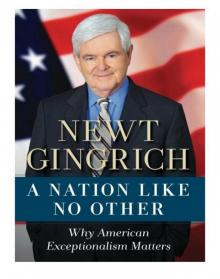 A Nation Like No Other
A Nation Like No Other To Try Men's Souls - George Washington 1
To Try Men's Souls - George Washington 1 Pearl Harbor: A Novel of December 8th
Pearl Harbor: A Novel of December 8th Valley Forge: George Washington and the Crucible of Victory
Valley Forge: George Washington and the Crucible of Victory To Save America
To Save America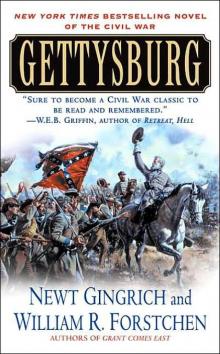 Grant Comes East cw-2
Grant Comes East cw-2 Victory at Yorktown: A Novel
Victory at Yorktown: A Novel Days of Infamy
Days of Infamy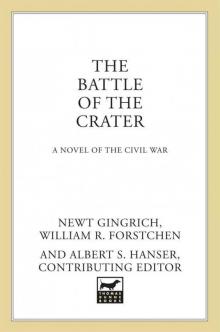 The Battle of the Crater: A Novel (George Washington Series)
The Battle of the Crater: A Novel (George Washington Series)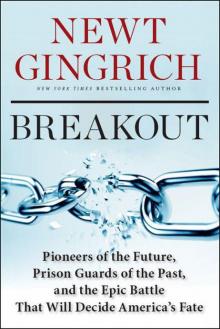 Breakout: Pioneers of the Future, Prison Guards of the Past, and the Epic Battle That Will Decide America's Fate
Breakout: Pioneers of the Future, Prison Guards of the Past, and the Epic Battle That Will Decide America's Fate Pearl Harbour and Days of Infamy
Pearl Harbour and Days of Infamy Pearl Harbour - A novel of December 8th
Pearl Harbour - A novel of December 8th Understanding Trump
Understanding Trump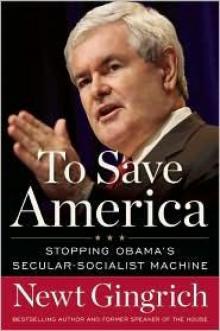 To Save America: Abolishing Obama's Socialist State and Restoring Our Unique American Way
To Save America: Abolishing Obama's Socialist State and Restoring Our Unique American Way